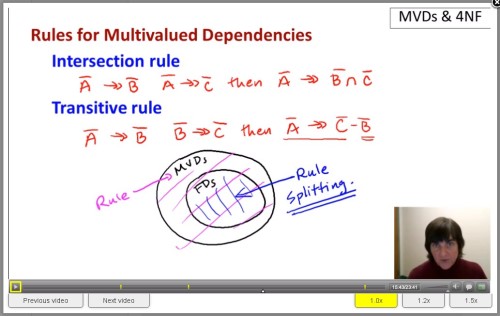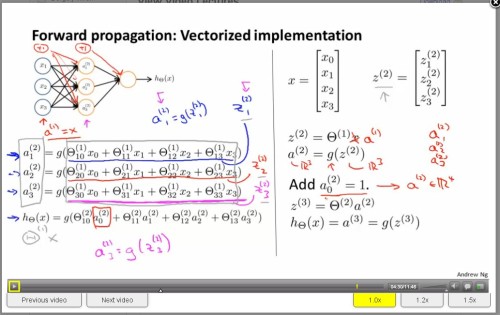The 2011 Autumn semester brought a handful of online classes, and it worked out pretty well for me, as I finished 3 courses and learned a lot. After that success, arguably spearheaded by Stanford, I think everyone was expecting big things to come, and the the number of offered courses, also the number of course offering entities multiplied. I was looking forward to it as well, planning to dig into all different topics, and had to start choosing between all those classes, since I was interested in so many but definitely didn’t have time for all. In the end, the new semester was mostly a failure for me. Fortunately that doesn’t mean a complete failure of things.
First of all, Stanford offered a lot of new courses, as more and more of their faculty wanted on, but then those courses were delayed by weeks, then months. It was pretty underwhelming and took some wind out of my sails. While I was waiting, I was looking around for other offerings, and fortunately there were some interesting stuff.
MITx 6.002x
MIT’s first offering (that I’ve seen) launched with quite the style, slick new website, corny promo video of two students preparing for and doing their MITx course, and so on. Nevertheless, the topic was interesting, 6.002x Circuits and Electronics. It’s right into the things I like to learn, and it’s engineering perspective (more practical) felt great to match my gaps in electronics education from the physicist point of view (more theoretical). It started great, and evolved a lot during the 14 weeks or running.
When it was new material, it was presented pretty well by Prof Anant Agarwal, it had great tools like interactive circuit design built right into the site, good quizzes, interesting questions. It was going all well, up until almost the end. Here’s the result of my course, ending in a grade C:
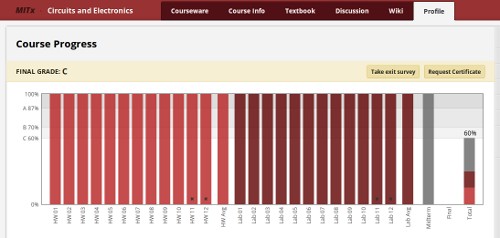
It all comes down to that I didn’t do the final exam. I could have. I had a whole weekend to do that, or about 4 days. Just it somehow didn’t happen, had “other things to do”, or something.
Right now it feels that all the things that went wrong with this course, can be traced back to handling it as the online version of the offline course (which is actually pretty explicit, denoting the course 6.002x, after the offline courss 6.002). If it was just about the content, it’s okay, but it was also about the teaching methods.
In the beginning I didn’t notice it a lot, but as the weeks progressed, one thing stood out is the number of reviews. Let’s review what you have just seen in the previous video. Then two videos later review it again. That got insanely boring in the end, and while I was managing it by skipping videos that were just reviews, my interest did take a little hit. It’s an online course, if someone wants to review a topic, can just watch the same video again, can’t they? Why not just refer to the previous material via a link or something?
The other thing is that for exams (the midterm and the final) they only left a weekend for, with 24h limitation after you opened the test. For an online course that seems to me again as a mistake, people are from all over the world, indeed they wanted to have a great variety of students from all different backgrounds, why to expect that people are available in a given 4 day interval? Let’s go a step further, why is there even a semester limit? I was doing multiple weeks in one go, then falling behind because not checking the site for a while. In the end, the whole 14 weeks of coursework, with exams and all, could be done in about 6 weeks if I wanted to, beside my daytime job. As soon as people go online, semesters make just as much sense as trying to stick to the same time zones for all the students – not much.
Of course, I’m very grateful for the whole course, even without taking the final exam I learned a lot, that I’m already using in the lab, and it helps me every time I do electronics (which is pretty much all the time). Just thinking that online education in this form is just faster horses, not automobiles, as Henry Ford would say.
It was a successful enough course, though, that it seems now they have extended the experiment into edX, an distance learning initiative. Let’s see what happens!
Venture Lab
From the new Stanford bunch, Venture Lab (originally Venture Class) was one I was really looking forward to, since there is so much entrepreneurial influence from others in my life at the moment, looks like half of my friends are up to something. It was pretty delayed, I guess partly because they were changing base idea of the course, and partly because they were building a brand new site from scratch for that. Originally it was to teach people about technology ventures (and I had the matching book called Technology Ventures earlier anyway) in the usual online class way. When it launched it became a “lab”, where people form teams and collaborate and actually create new stuff. It was going to be really exciting!
Then when it started, after a first week or two, or maybe even less, it turned out that managing a team, even 4 people, remotely is not such an easy thing. If we were in the same place, and we got together because of the same vision, it might have worked. This way, fragmented both in ideas, in space, available time, skills and everything, it wasn’t working that much. Which is a really big shame, because I really liked the people on the team. I really hope to get back in touch with them again and do something else, though that is unlikely.
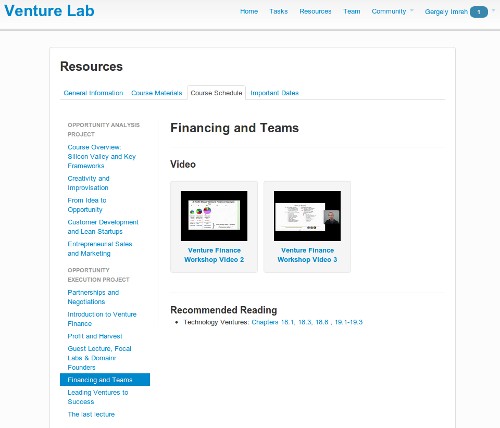
In the end I was just watching it from the sidelines (or still watching because due to the delay its semester hasn’t finished yet), and admiring the people who step by step built up something tangible. I heard multiple teams actually starting companies upon the ideas they came up with for the course. Now that’s some achievement! I feel a little bit that I missed a great opportunity to learn something, learn a lesson in an unusual way.
On the other hand, I did learn something actually: don’t throw good time after the bad one, if it feels it’s time to quit, then just do it. The sooner it’s done, the better everyone can move on to bigger and better things. So this course is not a total writeoff. And I’m still going to watch the videos, read the book, and get on with technology.
Udacity
This one was also something I was looking forward to, since Udacity was co-founded by Sebastian Thrun, who was an instructor in last semester’s AI Class. Looks like after last semester, he have seen the potential of online communities in learning environment, left Stanford (as far as I know) and came onto this project. They had and will have a lot of different classes, mostly IT related, from robotic cars to building website and programming languages.
I looked at a couple of different courses, and the most amazing thing was, that my friends, one of them programmer but in different area, another one not really a programmer at all, were already taking one of them – CS253 Web Application Engineering, no less! Of course I wanted to join them, collaborate and also challenge each other. Well, in the end, didn’t happen. By the time I got there, it was all over for the semester, and they both kinda dropped it, or procrastinated out of it along the way. That doesn’t smell like success to me, but as long as they are not discouraged, hope we can do something similar next time together, and if I get in on time, would do everything in my power to get every one of us through.
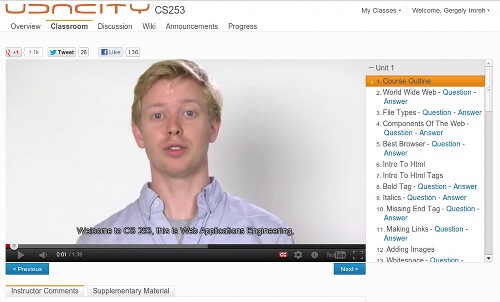
It looked good, Reddit and Hipmunk founder Steve Huffman showing you how to build some real stuff for the web? There should be one or two things to learn. If they keep it online, I’ll probably go back and check it some other time.
Next up
Looks like I failed this semester for a couple of reasons. Being busy with real life projects like Ignite Taipei and Future Shorts, as well as actually building stuff, I didn’t have that much time to study anymore. The teaching methods eroded my motivation sometimes. The peer pressure went on, but gone out too quickly as well. Now these things might be fixed next time
By now there are online classes everywhere, and universities are lining up to put online their classes. Can look around on Class Central to see what else is new. This time I looked up some humanities courses for the autumn and maybe check a bit more, cannot be without science, though definitely will try not to overcommit myself.
Now just have to see how this online learning experience will work out, whether the universities and knowledge providers will be able to fix the current deficiencies stemming from not using the Web to its full potential, just as “another medium”. But I think online learning / anywhere learning is here to stay, and the ball is on our court, the prospective life long students.
